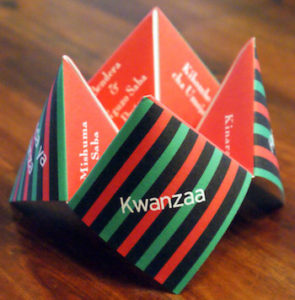
This month is the season of Kwanzaa; it is a cultural holiday.
Kwanzaa is a Swahili word for 'first fruits.' It is also an African American holiday that begins December 26 and continues through January 1. Observed throughout the world, it celebrates family, community, and culture. Kwanzaa has its roots in the ancient African first-fruit harvest celebrations. Its modern history, however, begins in 1966 when Black scholar and activist Maulana Karenga developed it.
Kwanzaa is organized around five fundamental activities common to other African first-fruit celebrations:
(1) The ingathering of family, friends, and community;
(2) Reverence for the creator and creation (including thanksgiving and recommitment to respect the environment and heal the world);
(3) Commemoration of the past (honoring ancestors, learning lessons, and emulating achievements of African history);
(4) Recommitment to the highest cultural ideals of the African community (for example, truth, justice, respect for people and nature, care for the vulnerable, and respect for elders);
(5) Celebration of the "Good of Life" (for example, life, struggle, achievement, family, community, and culture). Kwanzaa is celebrated through rituals, dialogue, narratives, poetry, dancing, singing, drumming, other music, and feasting.
A central practice is lighting the mishumaa (seven candles) of Kwanzaa. A candle is lit each day for each Nguzo Saba (Seven Principles). These principles are Umoja (unity), Ujichagulia (self-determination), Ujima (collective work and responsibility), ujamaa (cooperative economics), Nia (purpose), Kunmba (creativity); and Imani (faith).
Kwanzaa ends with a day of assessment on which celebrants raise and answer questions of cultural and moral grounding and consider their worthiness in family, community, and culture.
Kwanzaa: A Celebration of Family, Community, and Culture
by Maulana Karenga,
University of Sankore Press, Los Angeles
Copyright 1998, by Malulana Karenga
ISBN 0-943412-21-8